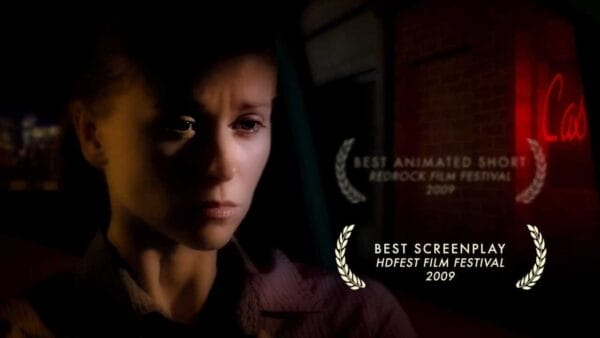The Curious Case of The Crooked Eye
What in the World Happens
Picture, if you will, a quiet woman named Sharon. On the surface, she drifts through daily routines—coffee, work, maybe mismatched socks—but beneath that mundane veneer bubbles memories of a marriage falling apart. Every flicker of memory, every fragment of guilt, stitches together a dreamlike tapestry of what once was. Reality and recollection blur until “daily drudgery” feels like walking a tightrope over fog, her worst mistakes echoing in rooms that don’t exist. Shadows of the past taunt her, reminding Sharon that the world is unreliable when your heart isn’t certain.
As Sharon navigates her routine, ghostly echoes from her marriage—moments of hurt, quiet resentment, longing—push her inward. She tries to hold on to what’s left of normal: interactions with her supervisor, her doctor, co-workers. But everything seems skewed. The green-screen environments pulsing around her underscore that life is being constructed: every room, every street outside, every gleam of sunlight is part memory, part artifice.
The story doesn’t build to a fight scene or big reveal so much as it crescendos in emotional tension: Sharon finally confronts the accumulation of guilt, the sense that perhaps she has become someone she no longer recognizes. Her attempts to mask pain, to keep going, are undermined by the relentless whisperings of memory, narrated from without and from within. In the final stretch, Sharon doesn’t defeat her past—she stands with it, acknowledges it, and even though the world hasn’t neatly fixed itself, she is changed. Surreal isn’t a place on a map—it’s this inner terrain.
Makers & Players: Who Did What
- Writer (short story): Betty Malicoat
- Adapted, Directed & Edited by: D. C. Douglas
- Narrator: Linda Hunt as Sharon’s Narrator
- Casting for main roles:
- Fay Masterson as Sharon
- Katherine Boecher as Rosemary
- D. C. Douglas as Frank
- Joe Duer as Roy
- Clement Blake as Wayne
- Monnae Michaell as Sharon’s Supervisor
- Ari Barak as Sharon’s Doctor
- Robin Daléa as Tough Co-Worker
- Karen McClain as Loud Co-Worker
- Music by: Abraham Peraza & Lilia Popova
- Cinematography: Nickolas Rossi
- Visual Effects / Animation & Environment: Green-screen sets, compositing, 3D modelling (led by Pency Kinnard, with Newton DePaoli, Matt Griffith and others)
Why It Feels So Strange (In a Good Way)
The film (about 18 minutes long) plays with perception: what’s real, what’s remembered, what’s invented. The choice to shoot entirely on green screen gives it an otherworldly feel—rooms that seem familiar but impossible. The narration by Linda Hunt acts like an inner voice peeling back the layers of Sharon’s mind. Visual effects aren’t there to dazzle but to unsettle: a costuming change, a shift in environment, a flash of guilt. All of it conveys that the ground keeps shifting beneath Sharon’s feet.
Accolades, Credits & Side Ventures of Fay Masterson & Linda Hunt
Fay Masterson
- British actress, active since childhood, started as a dancer until being cast in The New Adventures of Pippi Longstocking and later roles in films like The Man Without a Face, Eyes Wide Shut.
- Television credits include many guest and recurring roles: for example The Last Ship as Andrea Garnett, appearances in NCIS, CSI: Miami, Ghost Whisperer, among others.
- Voice acting in video games: she has lent her voice to several video game characters. :contentReference[oaicite:2]{index=2}
- Over seventy credited screen roles across film, TV, and voice work.
Linda Hunt
- Won the Academy Award for Best Supporting Actress (1983) for her portrayal of Billy Kwan in The Year of Living Dangerously, making history as the first performer to win an Oscar for playing a character of the opposite sex. :contentReference[oaicite:4]{index=4}
- Won the Australian Film Institute Award in 1983 (Supporting Role) and the Jury Award; multiple critics’ circles recognized her performance (Boston, Los Angeles Film Critics, etc.).
- Nominated for a Golden Globe in 1984 for Best Performance by an Actress in a Supporting Role in a Motion Picture for the same role. :contentReference[oaicite:6]{index=6}
- Broadway / theatre work includes being nominated for a Tony Award for Best Actress in a Play for her performance in End of the World. :contentReference[oaicite:7]{index=7}
- Long career across film, television, theatre, voice‐over and narration; roles in notable films such as Dune, Silverado, Kindergarten Cop, and animated / voice roles in things like Pocahontas. :contentReference[oaicite:8]{index=8}
- Regular appearances on television dramas and procedurals: for example recurring roles in series like The Practice, and long‐running part on NCIS: Los Angeles.
Some Accolades & Aftermath
Yes, this little gem collected awards. It won Best Animated Short at the Red Rock Film Festival in 2009. It also snagged Best Screenplay at HDFest, and was honored for its narration at the Seattle True Independent Film Festival. Wikipedia, official site, etc., have fuller award listings.
It played in about twenty film festivals, found life on iTunes and Amazon, stirring discussion about how depression, anxiety, guilt can be felt onscreen—with artistry, with surreal splashes. For full cast, crew, plot and awards details see the record at The Crooked Eye page on Wikipedia. (link)









